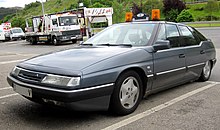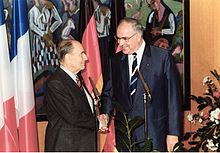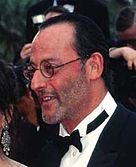|
L'Opération Corned-Beef
L'Opération Corned Beef is a French film directed by Jean-Marie Poiré. It was filmed during the summer of 1990 and released on 6 February 1991. It was the fifth collaboration between screenwriters Jean-Marie Poiré and Christian Clavier. The film also brought actors Christian Clavier and Jean Reno together, before their appearance in Les Visiteurs. Synopsis The film begins in Bogotá, Colombia. Captain Philippe Boulier, called 'Le Squale' (The Shark) (Jean Reno), is monitoring the actions of Augusto Zargas (André Schmit), a former Argentinian colonel and current arms dealer. To track his movements, the French secret service (DGSE) hides a microphone in the engagement ring of Marie-Laurence Granianski (Valérie Lemercier), an interpreter for the consul general, one of Zargas' associates (Marc de Jonge). Ms. Granianski wants to take a few days off to celebrate her wedding anniversary with her husband, Jean-Jacques (Christian Clavier). 'Le Squale' tries to sabotage the couple's relationship by tempting the husband with a beautiful woman, so that Ms. Granianski will cancel her wedding anniversary and remain at the consulate. 'Le Squale' does not know that the agent they send is actually his own fiancé, Isabelle (Isabelle Renauld), but in the end, Jean-Jacques Granianski, an average Frenchman and corporate psychologist, resists the secret agent. Technical details 
Cast
ProductionGenesis and developmentChristian Clavier and Jean-Marie Poiré pitched the film to producer Alain Terzian over dinner one evening. He was enthusiastic, but unsure about the title. He suggested renaming the film Le Squale (after the main character), but the authors preferred to retain the original title. Jean-Marie Poiré had great difficulty getting the project started because of his recent failure with Mes meilleurs copains. CastingWhile Jean Reno was taking his first lead role in a comedy, Valérie Lemercier gained her first major supporting role in a film, after some minor appearances in other films. Gérard Depardieu was initially asked to play "Le Squale", but he refused. He nevertheless shot Les Anges gardiens with Jean-Marie Poiré and Christian Clavier four years later. Other actors were considered, such as Daniel Auteuil (who was shooting the film Lacenaire), Thierry Lhermitte, Gérard Lanvin, Pierre Arditi,[7] and Bernard Giraudeau. It was Marie-Anne Chazel, companion of Christian Clavier, who suggested Jean Reno for the role of "Le Squale". Producer Alain Terzian, in an interview with Première, narrated the hiring of Jean Reno:
Jean-Marie Poiré had great faith in this duo, which mixed the generations of Le Splendid with Christian Clavier and The Big Blue with Jean Reno. Catherine Jacob had to turn down the part of Marie-Laurence Granianski because she was already cast in Merci la vie, directed by Bertrand Blier. Ironically, she received a César Award nomination for Best Supporting Actress alongside Valérie Lemercier who was cast as Marie-Laurence Granianski. Carole Bouquet was also approached for the role. It was Françoise Menidrey, a casting director, who suggested that Jean-Marie Poiré and Alain Terzian see a performance of the play Un fil à la patte at the Théâtre du Palais-Royal and pay attention to one of the supporting actresses, Valérie Lemercier: Poiré and Terzian "laughed their head off" during the play and she was hired for the film.[8] This film marks the first collaboration of the quartet Poiré–Clavier–Reno–Lemercier, who were reunited in Les Visiteurs two years later, in 1993. Many young actresses auditioned for the role of Isabelle Fourreau. Poiré finally chose Isabelle Renauld, who was at the beginning of her career. To represent the President of the Republic, a character only seen from behind in the film, a "casting of skulls" was made to find an actor whose head looked closest to that of François Mitterrand. ShootingStuntsInitially, the scenes taking place aboard the Citroën BX had to be made on a voiture travelling, a common filming technique where the actor pretends to drive the vehicle. However, in these conditions, the travelling car can only roll at low speed and this posed problems during the shooting of the scene on the national road, where the BX is supposed to roll at 140 km/h. Because the car was travelling slowly, they were overtaken by trucks that honked at them or flashed their lights, which made the filming impossible. Jean Reno himself made the decision to actually drive the BX 140 km/h on the national, among the flow of normal traffic, with a remote camera attached to the hood of the car and the sound recording equipment installed in the trunk. Also, with Jean Reno performing some "simple" stunts at the wheel of the BX, Christian Clavier's fears, as a passenger, were very real. Cars The film honors the Citroën range of the moment, where several contemporary models of the brand appear throughout this comedy (AX, BX, XM, CX EVASION Ambulance, C 25).[9] All cars were loaned by Citroën: 
Filming locationsThe scenes supposed to take place in Colombia were shot in Mexico. During one scene, the Mexican flag is visible on a building. The Saviem SM 7 truck of occupational medicine, which acts as a "submarine" for DGSE agents, is parked in front of 74 avenue d'Iéna at Paris, in the 16th arrondissement, near the Arc de Triomphe. On his arrival to visit his wife Marie-Laurence (Valérie Lemercier) at the Consulate, Jean-Jacques Granianski (Christian Clavier) parks his Citroën BX in front of 74 avenue de Jena. The consulate is located opposite rue Auguste-Vacquerie. When Le Squale (Jean Reno) returned to Paris by plane from Colombia, he landed at Orly West Airport. Later in the film, in this airport Le Squale accompanies Graninski for a weekend in Venice with Maryline. The scenes where the Citroën BX rolls on the national road with Jean Reno and Christian Clavier on board take place on Route nationale 12 between the villages of Cherisy and Houdan. The scenes taking place at the home of the Granianski are supposed to happen at Dreux, at the fictional address "24 avenue du Paris, residence Pompadour". In reality, the shooting took place on Allée des Terres Neuves in Croissy-sur-Seine. The scene where the old lady enters the portal of a hospice was shot in Theuville, in the Val-d'Oise. The Citroën XM of General Masse (Jacques François) is parked in the underground parking George V, Avenue George V in Paris 8th arrondissement. When Le Squale (Jean Reno) and Aspirant Garcia (Mireille Rufel) return to Paris after the explosion of the Granianski BX, and after abandoning it in the middle of the countryside, they park the SEAT Marbella level 41 avenue George V, at the time before Bank Hervé (now replaced by an Armani store). In the background, there is a poster of the film Bienvenue à bord!, a French film by Jean-Louis Leconte with Pierre Richard and Martin Lamotte, released in September 1990. Scenes are then shot at the Hotel Prince de Galles. For the end of the film, many scenes were shot in the Parc Astérix and on its parking lot. A particular scene takes place on the aquatic attraction named at the time "The Descent of the Styx". Dubbing Didier Gustin, at that time little known, imitates François Mitterrand and Helmut Kohl in a short scene, as they appear only from the back. MusicMusic for the film was composed by Eric Lévi, former member - and founder - of the group Shakin' Street, whose song "Solid As Rock", written by Fabienne Shine, appears in the film. The main song of the film, "Passion For War / Love", was written by R. Stone and Éric Lévi and sung by Joan Paladin (Joan Peltz). The album containing the music from the film, titled simply Bande Originale du Film L'Opération Corned-Beef, was released the same year as the film.
All tracks are written by Eric Lévi
ReleasePromotionThe trailer shows images from the film accompanied by a voice-over from Jean Reno (playing the role of Le Squale), sending an audio message to "My Dear Georges":
ReceptionValérie Lemercier's performance was nominated for the César Award for Best Supporting Actress in the 17th César Awards.[11] She did not win the César but two years later received it for her dual role in Les Visiteurs, Jean-Marie Poiré's next film. Box officeL’Opération Corned Beef was placed 15th in the box-office of France in 1991, with 1,475,580 admissions. It grossed 23 million French francs in France.[1] AwardsNominationAround the film
Notes
References
See alsoExternal linksWikimedia Commons has media related to L'Opération Corned-Beef.
|
|||||||||||||||||||||||||||||||||||||||||||||||||||||||||||||||||||||||||||||||||||||||||||||||||||||||||||||||


